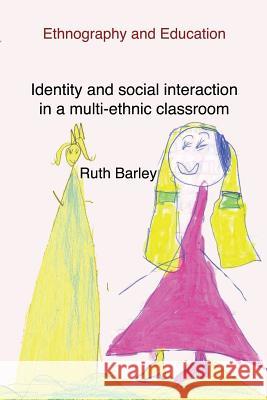Identity And Social Interaction In A Multi-ethnic Classroom: Ethnography and Education » książka
Identity And Social Interaction In A Multi-ethnic Classroom: Ethnography and Education
ISBN-13: 9781872767345 / Angielski / Miękka / 2014 / 190 str.
Drawing on research findings from an ethnography conducted with young children that explored patterns of interaction and notions of difference and identity, this study uncovers how four and five year-olds conceptualise and operationalise identity in a multi-ethnic Early Years classroom in the North of England. The study provides in-depth insight into the experiences of a diverse group of children from North and Sub-Saharan African countries who have come together in a single school setting. It highlights how these children are influenced by social structures such as those pertaining to racism, gender inequality, Islamaphobia, 'the war on terror' and events in the Arab Spring. The research shows that children's everyday social interactions are enabled and constrained by these wider structural discourses as they (re)negotiate their unfolding identities over time against this complex backdrop. Dynamic local and global politics, the arrival of new classmates, changes in family structures and Koranic school attendance all influence children's everyday sense of self and are reflected in the development of peer relationships at school. Developing a theoretical framework that understands identity as performative, situated and dialectical, this study discusses the dual roles of structural discourses and social agency in the context of identity (re)negotiation. Identity is framed within a 'strong structuration' framework that seeks to understand ontology-in-situ as the study uncovers how young children understand notions of self and others and how wider social discourses of discrimination and hierarchies of difference play a part in how young children understand ethnic, religious and gender difference. The study unearths how young children explore their own and their peers' identities amongst themselves and raises questions for how policy and practice can best support them in this aspect of their social development.
Drawing on research findings from an ethnography conducted with young children that explored patterns of interaction and notions of difference and identity, this study uncovers how four and five year-olds conceptualise and operationalise identity in a multi-ethnic Early Years classroom in the North of England.The study provides in-depth insight into the experiences of a diverse group of children from North and Sub-Saharan African countries who have come together in a single school setting. It highlights how these children are influenced by social structures such as those pertaining to racism, gender inequality, Islamaphobia, the war on terror and events in the Arab Spring. The research shows that childrens everyday social interactions are enabled and constrained by these wider structural discourses as they (re)negotiate their unfolding identities over time against this complex backdrop. Dynamic local and global politics, the arrival of new classmates, changes in family structures and Koranic school attendance all influence childrens everyday sense of self and are reflected in the development of peer relationships at school.Developing a theoretical framework that understands identity as performative, situated and dialectical, this study discusses the dual roles of structural discourses and social agency in the context of identity (re)negotiation. Identity is framed within a strong structuration framework that seeks to understand ontology-in-situ as the study uncovers how young children understand notions of self and others and how wider social discourses of discrimination and hierarchies of difference play a part in how young children understand ethnic, religious and gender difference. The study unearths how young children explore their own and their peers identities amongst themselves and raises questions for how policy and practice can best support them in this aspect of their social development.











